



For the third consecutive year, Silver Cross Wound Healing and Hyperbaric Medicine in New Lenox has received the Clinical Distinction Award from RestorixHealth.





For the third consecutive year, Silver Cross Wound Healing and Hyperbaric Medicine in New Lenox has received the Clinical Distinction Award from RestorixHealth.
Silver Cross Hospital is pleased to announce Silver Cross Wound Healing and Hyperbaric Medicine is a recipient of RestorixHealth’s Clinical Distinction Award. Recipients of this award meet or exceed national clinical benchmarks over a set period of time.
“This achievement reaffirms the high quality of care the Silver Cross Wound Healing and Hyperbaric Medicine provides our patients every day,” said Dr. Sudarsana Chakrabarti, Medical Director for the wound center. “We are proud to be a recipient of an award that recognizes how the hard work and dedication of our staff has produced positive patient outcomes.”

Silver Cross Wound Healing and Hyperbaric Medicine is dedicated to optimizing outcomes and preventing lower limb loss in patients with non-healing wounds. Their approach to wound care is comprehensive, coordinating traditional and advanced therapies that aid and accelerate the healing process. The center is staffed with clinicians with advanced training in wound care and hyperbaric medicine. Integrating a team of wound
care professionals optimizes patient care while offering the most advanced healing options.
Silver Cross Wound Healing and Hyperbaric Medicine is located on the Silver Cross Hospital campus in Pavilion D at 1851 Silver Cross Blvd., New Lenox, IL 60451 and is open Monday through Friday, 8 a.m. to 4:30 p.m. For more information, call (815) 300-5997.
Committed to excellence in wound care, RestorixHealth is the wound care solutions company providing programs, services, products and education across the care continuum. From developing and operating wound centers in partnership with hospitals, through delivering professional wound care in nursing facilities and inhome settings, to supporting patients through the coordination of wound supplies, RestorixHealth’s solutions increase access to care, reduce hospital admissions and most importantly, improve patient outcomes and quality of life. For more information, visit RestorixHealth.com



We’ve partnered with Chicago’s best and brought them to New Lenox.
We’re delivering exceptional care more conveniently than ever before! Through our partnerships with
• Shirley Ryan AbilityLab
• UChicago Medicine


• Ann & Robert H. Lurie Children’s Hospital
• Rush University System for Health
you have access to the latest treatments and therapies without the commute. That’s the way you should be treated.
Visit silvercross.org or SCAN the QR code for a referral to a specialist at Silver Cross.







UNIQUE INDIVIDUALS WHO PROVIDE SPECIALIZED MEDICAL SERVICES
Dr. Kamran Ayub is a world-renowned expert in advanced endoscopy and specializes in all areas of interventional endoscopy.
During his noteworthy career, he’s performed more than 75,000 procedures, including complex endoscopic retrograde cholangiopancreatography (ERCP) to diagnose and treat problems in the bile ducts, pancreatic ducts, liver, gallbladder and pancreas. He performs endoscopic resections and endoscopic anti-reflux procedures, including the highly advanced transendoscopic incision-less fundoplication (TIF), which repairs the valve at the end of esophagus to prevent acid from the stomach refluxing back into the throat.
Dr. Ayub also performs colonoscopies, upper endoscopies and a host of other sophisticated procedures to diagnose and treat digestive health issues, including endoscopic mucosal resection (EMR), a minimally invasive procedure used to treat Barrett’s esophagus, early-stage cancers of the esophagus, stomach, colon and rectum; and precancerous lesions. Because EMR can remove irregular tissues from the lining of the digestive tract without making cuts through the skin, it can be used as an alternative to surgery in many cases, resulting in fewer health risks and a faster recovery.
Dr. Ayub serves as the Medical Director of the Advanced Endoscopy Center at Silver Cross Hospital in New Lenox, a program he helped found

more than 16 years ago. Under his direction, the Center draws patients from around the Midwest because of the innovative procedures performed and successful outcomes achieved.
The Center provides a full range of advanced medical services from diagnosis to treatment of even the most challenging gastrointestinal disorders and includes four state-of-the-art endoscopic procedural suites; private rooms for patient preparation and recovery; advanced supportive services for diagnostic imaging and laboratory testing; 24-hour on-call testing and intervention for patients with urgent needs and more. Additionally, the Center earns top scores for patient satisfaction every year.
In addition to performing sophisticated endoscopy procedures at Silver Cross, Dr. Ayub holds several
patents on technology related to advanced interventional endoscopy. He has a passion for teaching, research and innovation, and has published numerous articles and abstracts;, written two book chapters; and has spoken extensively at national and international meetings. In addition, Dr. Ayub has directed numerous courses, seminars, webinars, and workshops related to advanced endoscopy at Silver Cross.
Dr. Ayub completed his residency in Internal Medicine from Greater Baltimore Medical Center in Maryland, where he was selected as Chief Resident in the final year of his residency. Dr. Ayub completed his fellowship in Gastroenterology and later Advanced Endoscopy from the prestigious Baylor College of Medicine in Houston Texas. He spent several months in Paris, France, training in Interventional Endoscopic Ultrasound. Dr. Ayub has previously worked as Director of Endoscopic Ultrasound at Baylor College of Medicine, and Director of Advanced Endoscopy Fellowship at Virginia Mason Medical Center in Seattle, WA.
For more information about Dr. Kamran Ayub and the Advanced Endoscopy Center at Silver Cross Hospital, visit silvercross.org


1 in 3 people in the United States, live with varicose veins, according to the Society for Vascular Surgery. Though some people may not sense any symptoms, others with varicose veins can experience burning, throbbing, itching, cramping, heaviness, or other pain.
In addition, the heat that summertime brings is known to irritate varicose veins and intensify symptoms, says Kathe Malinowski at Eterna MedSpa & Laser Vein Center
In the summertime, our circulatory system combats the effects of high temperatures by increasing the size of our veins, a process known as venodilation. This is for better blood flow to cool down the body. During this process swollen varicose veins widen further, filling with additional blood, worsening the symptoms and creating more bulging. The potential risk for related health complications also heightens, says Malinowski.
Tips for Summertime Vein Health
• Keep Cool and don’t stay in the sun for long periods of time.
• Stay well hydrated
• Eat a healthy diet, low in sodium and pack in the Vitamin C for Vein health
• Avoid sitting or standing too long and elevate your feet above your heart for a few minutes each time.
• Exercise to keep blood flowing. Malinowski recommends walking in the early morning and evening when it is cooler, and the sun is at its lowest or participating in a cooling exercise like swimming to stimulate blood flow.
Eterna MedSpa & Vein Laser Center
At Eterna MedSpa & Vein Laser Center, our vein specialists and doctors ensure all your vein needs are met. Whether you are looking to have spider veins or varicose veins addressed, we are here to help. We offer conservative vein therapy and other cutting-edge treatments. If you have questions or would like to schedule a free consultation, please call us at 815-254- 8888



When Lincoln-Way East High School teacher Jason Berg noticed blood in his stool at age 42, his primary care doctor recommended he have a colonoscopy.
“My Dad’s father had colon cancer, and it wound up in his liver, and he passed away of cancer in his 60s,” Berg, of New Lenox, said.
His doctor referred him to Dr. Reza Gamagami, general and robotic surgeon on staff at Silver Cross Hospital in New Lenox.
“He was great from the first second I met him,” Berg said. Dr. Gamagami said Berg’s family history was key, despite his otherwise healthy lifestyle.

also know nearly 53,000 people in the U.S. die each year from colorectal cancer. Research shows that colonoscopies can reduce the risk of colorectal cancer by 69 percent.
During Colorectal Cancer Awareness Month in March, they want to let people know nearly 88 percent of colorectal cancer deaths can be prevented by having a colonoscopy, considered the gold standard of detecting colon cancer.
Gastroenterologist Dr. Kamran Ayub said Silver Cross had been performing 5,000 to 6,000 colonoscopies a year.
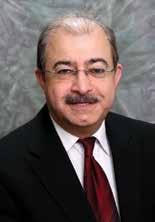
Dr. Kamran Ayub Medical Director, Silver Cross Advanced Endoscopy Center

ple look forward to, however.
“Let’s face it, who wants to drink a gallon of prep or take a bunch of pills, and sit on the commode the night before and have 20 bowel movements,” Dr. Gamagami added. “There’s no question, though, colonoscopy is the best way to diagnose any ailment that has to do with your colon.”
Berg’s results showed rectal cancer, a diagnosis he wasn’t expecting.
Dr. Reza Gamagami General and Robotic Surgeon
“Here, you have a 42-yearold with rectal bleeding, with a family history of colon cancer, and that increases your risk two to three times. Contrary to what we were used to seeing, Jason was extremely fit, extremely active. And he eats well. And you would think everything should be OK.”
But Dr. Gamagami and his colleagues
“But now, with two more rooms in our endoscopy center, we’re performing 7,000 to 8,000 procedures a year. Many of those are screening procedures, where we go in and look for polyps that may be pre-cancerous,” he explained.
Since stool-based tests like fecal occult and Cologuard can have false positives and negatives, he added, “It’s best to just get the colonoscopy.”
Colonoscopy isn’t something most peo -
“I thought this was going to be some kind of internal hemorrhoid…or something,” he said. “Not a big deal. And then, I was shocked, I was scared. It was rough. My wife, Alicia, was eight months pregnant at the time.”
She had a difficult time with the news as well, but the Silver Cross team was a comfort.
“I was scared. I couldn’t breathe. My husband had cancer. He was young. He was healthy. I felt like I was out of control. But there were so many doctors. He had a team. And they made you trust them,” she said.
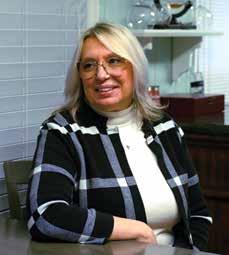
Yvette Vana said she was “definitely guilty” of pushing off certain exams.
“’I’m too busy; I’ll get to that later.’ And ‘later’ became a couple years. I never had a colonoscopy. And I did have symptoms. I had a little bit of bleeding; a little bit of cramping. And I thought, well, it could be related to something else.”
Her primary care physician didn’t want to take a chance, referring her to Dr. Rameez Alasadi, an interventional gastroenterologist with Premier Suburban Medical Group.
While she was in recovery, Dr. Alasadi told her husband she had a cluster of polyps. Later, they found two were cancerous, and one was pre-cancerous.
“Dr. Alasadi was very compassionate, and he was very quick to say, ‘Let’s get a plan going.’”
Dr. Alasadi said Vana was fortunate that the cancer was isolated to the polyps. So, removing them was enough to cure her, he said, adding, “her risk for cancer recurrence is very, very low.”
Dr. Alasadi said they are seeing more
and more cases of younger people being diagnosed with colon cancer, and genetic predisposition is only one factor.
“We believe this is most likely related to an unhealthy lifestyle. We’re seeing obesity at childhood related to exposure to highly processed foods. Other risk factors are cigarette smoking, eating red meat and excessive alcohol consumption. These are modifiable risk factors.”
Genetics was Berg’s major risk factor, and nothing could change that. Dr. Gamagami set up a treatment plan immediately, a course of radiation therapy, followed by six months of chemotherapy and then surgery.
“We have found that doing the therapy before surgery reduces the risk of the cancer metastasizing or recurring,” he said.
While the radiation therapy was fairly easy, Berg admitted the chemotherapy wasn’t. But he had his wife, his family and a new baby to help get him through.
Dr. Gamagami performed robotic-assisted surgery using one of the hospital’s highly advanced da Vinci platforms by Intuitive.

Dr. Gamagami removed Berg’s tumor and his rectum – the last six inches of the colon – without damaging any major nerves that control bodily functions.
Allowing the patient to live a normal life after removing the cancer is important, Dr.
Gamagami said, especially in a person so relatively young.
“When I met him, not only was he young, but he had two children, and his wife was pregnant,” said Dr. Gamagami, beginning to get emotional.
“It’s different when patients are older. Their kids are older; they’ve led a full life. But younger people have their life in front of them. If it’s not for yourself, do it for your family.”
Getting the colonoscopy was crucial, Berg said. “Without it, they may never have found the cancer, and I could be dead right now. It’s not bad. The worst part is the drink, but it can save your life.”
VANA’S MESSAGE IS: DON’T WAIT.
“Don’t ignore what your body is trying to tell you. Pay attention to everything. But then, don’t wait. I wish that I hadn’t waited. I had great news, but I don’t know that everyone would have great news. And that’s what I want my children to realize. I want them to be proactive; get that colonoscopy at 45.”
Berg said he is forever grateful to the team at Silver Cross.
“Dr. Gamagami was amazing. I cannot speak highly enough of him and the care that he gave. I want to say how grateful I am for my whole team of doctors. All the nurses, all the staff. Everyone was just amazing.
“I am forever in their debt for keeping me around for my wife and kids.”
To learn more about a colonoscopy screening at Silver Cross Hospital, visit silvercross.org

Health should be a priority, but too often life gets in the way and individuals take a reactive, rather than proactive, approach to their personal well-being. But living healthier need not be so difficult. In fact, research suggests that small, positive changes in how a person lives each day creates a healthier person over time.
A Hologic-Gallup survey on the state of women’s health conducted in April 2024 found 63 percent of respondents said it was hard for them to make health a priority. They cited feeling overwhelmed, needing to care for others before themselves, emotional/mental health, and work as the top barriers to focusing on health. But it’s important that both women and men recognize that small changes can add up to big results. These healthy habits can help individuals start living healthier lifestyles.
• Get some exercise. Regular physical activity is one of the most important things a person can do fo his or her health. Exercise helps manage weight, reduces the risk of disease, strengthens bones and muscles, and improves brain health. The Centers for Disease Control and Prevention says adults should aim for at least 150 minutes (30 minutes a day for five days) of moderateintensity aerobic activity a week. A great place to begin is with a daily walk, which is a simple and effective habit that does not require a lot of time and no equipment except a good pair of athletic shoes.
• Wear sunscreen every day. After washing your face each
morning, apply a facial moisturizer with an SPF of at least 30, or blend equal parts of sunscreen and regular moisturizer, suggests Harvard Health. Use it on the face, neck, ears, and any thinning hair spots on the scalp. Skin cancer is the most common type of the disease worldwide, and wearing sunscreen can help many people avoid it.
• Spend time outdoors. It takes just a few minutes in the sun to raise vitamin D levels. Vitamin D is necessary for bone and heart health and helps to boost mood, says WebMD. Various studies indicate spending time in green spaces promotes calm and increases happiness.
• Plan your meals. Meal planning is not just a way to manage food budgets. It’s also a great method to being more mindful of food choices and avoiding impulse buys or meals that may not be as healthy as they can be. Adding more plant-based foods to a diet is a good start. Such foods can reduce the risk of chronic conditions like high cholesterol and hypertension.
• Stay hydrated. Hydration supports good digestion, increases energy and may improve brain performance, states Harvard Health. Drink a glass of water each day upon waking up and with every meal. Older adults often do not feel thirst like they did when they were younger, so it is especially important for seniors to stay hydrated.
Healthy habits are more easily adopted when people begin small and make a daily commitment to their overall health.
While pickleball isn’t necessarily a new sport, it sure has become all the rage in the last few years. A cross between tennis, badminton and ping pong, it’s easy to understand why the popular sport has appeal among such a wide audience, not to mention the health benefits.
Along with the cardiovascular benefits that come with increased heart rate, playing pickleball helps improve balance, coordination and mobility, along with building muscle and bone strength. But like any sport or activity, playing pickleball also carries a risk of injury, especially when someone takes to the court without any precautions.

And don’t forget about cool down after playing.
“Static stretches are recommended after you’re done playing to reduce muscle tension and improve flexibility,” she said. “All of these things can help prevent injury.”
“We see quite a few pickleball injuries every year, ranging from elbow to shoulder injuries, ankle sprains, and knee injuries,” says Michelle Peterson, a physical therapist and Orthopedics & Sports Medicine Rehabilitation Manager at Morris Hospital & Healthcare Centers. “Some of that is because a lot of older folks are playing pickleball. When we reach 40, we probably don’t realize that we should warm up and train a little bit before going right into playing any kind of sport.”
Cross training for 4-6 weeks before joining a pickleball league is highly recommended.
“You don’t want go to out and play pickleball without building up some endurance, and you can do that with a cardiovascular activity like swimming or cycling,” says Peterson. “Injuries are more likely to happen when you get fatigued out on the court. Your muscles can even start to get fatigued because they’re not getting enough oxygen. That’s when injuries happen.”
In addition to cardio exercises to build endurance, Peterson emphasizes the importance of overall strength and conditioning, with a particular focus on core strengthening, which is essential for sports like pickleball that demand upper-body stability, balance and power.
“You want to make sure you do some type of core strengthening to enhance the key muscle groups before you start playing. For pickleball, that’s going to include your legs, upper body, and core,” she said.
Like any sport, Peterson also said it’s important to warm up just prior to playing. Dynamic stretching is best, which means movement with stretching. For help with dynamic stretches, Peterson recommends going to YouTube and typing in dynamic stretches for rotator cuff, shoulder, hamstring, or dynamic stretches for pickleball in general.
Here are some additional tips to help reduce injury:
• To prevent ankle injuries, wear supportive shoes designed for court sports.
• To avoid wrist or elbow injuries, make sure the paddle grip on your racquet is appropriate for your hand size.
• Be cautious with your movements and play within your physical limits, especially if you’re an older player.
• When you’re not playing pickleball, make an effort to engage in other forms of exercise such as swimming, cycling or yoga. This will help reduce overuse injuries from repetitive pickleball movements.
• Be sure to allow your body time to rest and recover between games.
Peterson said it’s common to have some muscle soreness after the first few times you play, especially if you’re using muscles that haven’t been used in some time. But if the soreness – or pain – lingers for more than 48 hours, you might want to get checked out, especially if you’re experiencing sharp pain with specific movements.
“If you ignore what your body is telling you and keep playing, you risk ending up with an overuse injury,” she said. “Usually the longer someone puts off getting treatment for any injury, the longer it takes to recover and get better.”
If you think you might be experiencing a sports related injury, contact Morris Hospital Orthopedics & Sports Medicine, with locations in Diamond-Coal City, Joliet, Morris and Ottawa. For phone numbers by location, visit www.morrishospital.org/orthopedics
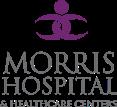
2024 was a rough year for 83-year-old Morris resident Joe Schmitz. For unknown reasons, he lost his inability to roll over in bed. Then he couldn’t get up from a chair on his own or fasten his seatbelt. He was having difficulty signing his name. As his physical abilities continued to deteriorate, he wondered if he was experiencing long-term effects from his two bouts of COVID.
Schmitz’s primary care physician ordered some tests to determine what was going on. While the results came back “perfect,” Schmitz knew something was drastically wrong. That’s when his primary care physician referred him to a neurologist and Schmitz received his diagnosis: Parkinson’s disease. It was all coming together now. Schmitz had given up golfing a few years earlier because of balance issues.
When he learned that Morris Hospital offers specialized Parkinson’s programs, Schmitz didn’t waste any time enrolling. In January 2025, he started participating in Pedaling for Parkinson’s, a free class offered through Morris Hospital and the Morris Hospital YMCA. Three times a week, Schmitz spends an hour in the cycling gym at the Y riding alongside others who have been diagnosed with the same condition. Evidence shows that cycling helps individuals with Parkinson’s improve their gait, balance, speech, handwriting, and overall endurance, helping to delay the progression of symptoms.
He also enrolled in an intensive outpatient rehabilitation program through Morris Hospital called LSVT BIG. Working with specially certified physical therapists and occupational therapists, Schmitz had to commit to one-hour therapy sessions four consecutive days a week over a period of four weeks, for a total of 16 sessions. The therapy focuses on improving gross and fine motor skills by re-training the brain and body to increase the amplitude of movements so they feel and appear more “normal” in size, which can help with tasks ranging from handwriting and buttoning clothes, to walking and going up stairs.
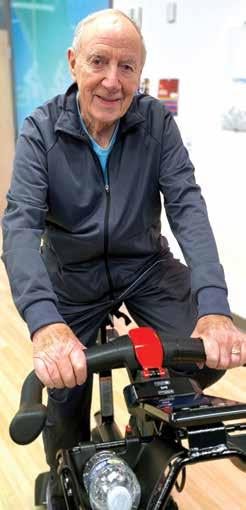
For Schmitz, the improvement was remarkable.
“The program is a God send,” said Schmitz. “When the therapists asked what I wanted to improve, I said my strength, signing my name, and being able to golf again. I worked hard at it, and I did everything that they told me to do. I can’t believe how much that four weeks helped me. I can’t tell you the difference. I finally had a vision of hope.”
Schmitz gets much of the credit for his success. While he was undergoing therapy, he did everything he was instructed to do at
home and continues to today.
“About every hour, I get up and walk 300 steps. It helps loosen me up,” said Schmitz. “Every night, I sit down and write a letter to improve my handwriting. And it keeps improving. I have to keep moving, keep active and stay positive.”
He praises the Parkinson’s programs and staff at Morris Hospital who have been part of his journey.
“I am so thankful for the LSVT program. It’s a wonderful program, and Pedaling for Parkinson’s is great too.” he said. “Morris Hospital is doing so many good things to help people with Parkinson’s. And we don’t have to drive to Chicago. We have qualified people right here in our community.”
Today, Schmitz is eagerly anticipating getting back on the golf course after a three year absence.
“I think I lost 2024. I wasn’t positive, and people who know me know that wasn’t the old Joe,” he shared. “I firmly believe that God isn’t done with me yet. He has bigger plans for me. Participating in the LSVT program at Morris Hospital has given me renewed hope that I can still lead a quality life.”
Morris Hospital offers specialized physical, occupational, and speech therapy programs called LSVT LOUD and LSVT BIG to help individuals with Parkinson’s improve their gross and fine motor skills and speech. For more information, call 815-705-3620 or go to www.morrishospital.org/parkinsons


Menstrual cycles are as unique as the women who experience them. While there are general guidelines — such as a cycle length of 21 to 35 days and bleeding that lasts between two to seven days — what’s considered “normal” can vary from person to person and even from month to month. Dr. Rosa Aramburo, an obstetrician/gynecologist with Morris Hospital Obstetrics & Gynecology Specialists, emphasizes that cycles often shift with age, after pregnancy, and leading up to menopause.
Many women face menstrual issues that interfere with daily life, yet these concerns are often dismissed. Painful periods affect 85% of women, heavy bleeding impacts nearly 50%, and irregular cycles are reported by
45%. Premenstrual syndrome (PMS), known for mood changes, bloating, and fatigue, affects up to 96% of women. “These issues are widespread and significantly impact daily activities, including school and work,” says Dr. Aramburo.
While some fluctuation in your cycle can be expected, you do not want to ignore persistent issues — particularly during adolescence or perimenopause. Dr. Aramburo advises seeking care “if symptoms interfere with your life, relationships, work, or school.” Seeking reassurance about your menstrual health can offer clarity and peace of mind. During an office visit, Dr. Aramburo will perform a comprehensive evaluation, including a physical exam, pelvic ultrasound, lab work, and a thorough medical history review. Even when no specific cause is found, many effective treatments can enhance quality of life. Depending on the individual’s needs and reproductive goals, these may include lifestyle adjustments, medications, and surgical options.

Above all, Dr. Aramburo emphasizes, “You are not alone. Menstrual issues are common, but they are not often discussed.” She encourages women to stay up to date on preventive care, including cervical cancer screenings and clinical breast exams. Being informed and proactive is the first step toward better menstrual health and well-being. With office locations in Morris, Channahon, Diamond-Coal City and Ottawa, Dr. Aramburo and Morris Hospital Obstetrics & Gynecology Specialists are excellent resources for every stage of your reproductive health. For more information or to make an appointment, call 815-941-0441 or visit morrishospital.org/obgyn
Morris Hospital and the Morris Hospital YMCA have teamed up to offer a series of health, wellness and nutrition seminars that provide invaluable support and guidance for individuals looking to establish and maintain healthy lifestyles.
Held at the Morris Hospital YMCA, 2200 W. Dupont Avenue, Morris, the seminars are free and open to everyone in the community age 18 and older. You do not have to be a YMCA member to participate.
Healthy Happens Here Schedule:
Tuesday, June 3, 5:30-6:30 p.m.
Do you know there are many dimensions that make up your overall wellness? Wellness is about more than just exercise and diet. In this seminar, Morris Hospital Wellness Manager Becca Evola will discuss each dimension and how they each play a role in your wellness. To register, call (815) 513-8080 or go to morrishospital.org/events and look under the category: Education Classes at the YMCA.
Thursday, June 19, 11:30 a.m.-12:30 p.m.
Nutrition labels can be confusing to read, especially since they have undergone some changes. A registered dietitian from Morris Hospital will teach you how to properly read nutrition labels so you are able to find the amount of nutrients (carbohydrates, calories, vitamins/minerals, sugar) you are eating. This class will also provide tips for grocery shopping. To register, call 815-7057358 or go to morrishospital.org/events and look under the Nutrition category.
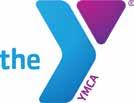


you have
•
• Shoulder • Elbow Hand •
• Hip • Foot or Ankle? Our specialists provide expert care and treatment of orthopedic-related injuries and problems, always considering conservative treatment methods first. And if surgery is needed, we offer the latest innovations and techniques to help you move well and live better, including MakoTM Robotic-Arm Assisted Surgery.
